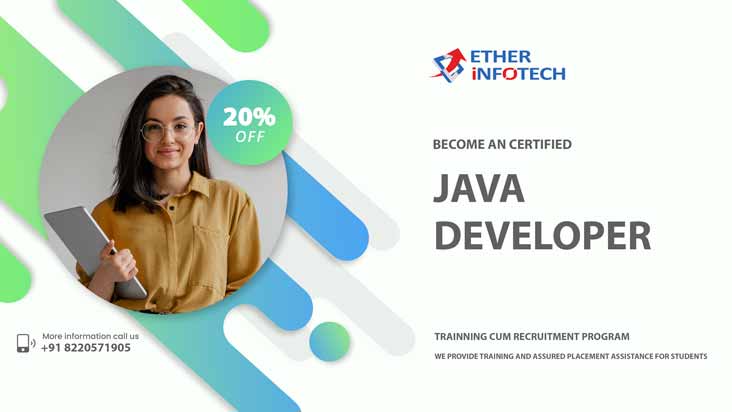Introduction: What is Full Stack Java Course & Why is it Such a Popular Programming Language?

Full stack Java Course programming is a hot topic in the world of software development. With its versatility and ability to work on multiple platforms, Java has become one of the most popular programming languages for web applications, desktop software, and mobile development. In this blog post, we will explore the basics of full-stack Java programming and provide some tips to help you get started.
- What is Full Stack Java Programming?
Full stack Java Course programming refers to the development of a software application using the Java programming language for both front-end and back-end development. In other words, a full-stack Java developer has the knowledge and skills to work on both the client-side and server-side of an application.
The front-end of an application is the part that users interact with. It includes the graphical user interface (GUI) and the code that runs in the user’s web browser. The back-end, on the other hand, is the part that runs on the server and communicates with the front-end. It handles tasks such as data storage, processing user requests, and generating dynamic content.
- Why is it Such a Popular Programming Language?
Full stack Java is an essential part of modern web development, and it plays a critical role in full-stack development. Here are some of the benefits of using Full stack Java in full-stack development:
- Versatility: Full stack Java can be used both on the client-side and server-side, making it a versatile language for full-stack development.
- Faster Development: Full stack Java allows for faster development with its dynamic nature and various frameworks and libraries that simplify development.
- Reusability: Full stack Java code can be easily reused across different platforms, and it supports multiple programming paradigms, making it highly adaptable.
- Popularity: Full stack Java is a highly popular language, with a vast community of developers constantly developing and sharing new tools, libraries, and frameworks.
- Compatibility: Full stack Java is compatible with most modern web browsers, making it an excellent choice for cross-platform development.
- Real-Time Web Applications: Full stack Java enables the creation of real-time web applications that can update information in real-time without requiring the user to refresh the page.
- Integration with other technologies: Full stack Java can easily integrate with other technologies such as HTML, CSS, and various databases, making it an essential tool for full-stack development.
- Large Developer Community: Full stack Java has a large and active developer community that continuously updates and improves the language, its frameworks, and tools, providing a wealth of resources for developers.
- Cost-effective: Full stack Java is an open-source language, making it an affordable and cost-effective choice for full-stack development.
Comparing Different Types of Full stack Java Courses & Their Benefits:

There are many different types of Full stack Java programming courses available online, each with its own unique benefits. Here are some of the most common types of JavaScript courses and the benefits they offer:
- Online Full stack Java courses: These courses are designed to teach learners how to program in Full stack Java Course through an online platform. They typically offer a structured curriculum, interactive exercises, quizzes, and video tutorials. Online Full stack Java courses are a popular option for self-paced learning and are often more affordable than in-person courses. Some popular platforms for online Full stack Java courses include Udemy, Coursera, and Codecademy.
- Full stack Java course tutorials: Full stack Java programming tutorials are typically shorter and less comprehensive than online courses. They are often focused on a specific topic or concept and are designed to teach learners how to code in Full stack Java by following step-by-step instructions. These tutorials may be available for free on websites like W3Schools or through video tutorials on YouTube.
- Full stack Java course certification: Full stack Java course certification is designed to help learners become certified in Full stack Java programming. These courses typically offer a comprehensive curriculum, assessments, and a final exam to test learners’ knowledge of the language. Certification courses are often more expensive than other types of courses, but they can be a valuable credential for job seekers in the tech industry. Some popular Full stack Java certification programs include Microsoft Certified Professional Developer (MCPD) and Oracle Certified Professional, Java SE 11 Developer.
Benefits of taking Full stack Java course:
- Enhanced career prospects: Full stack Java is a widely used language in web development, and learning it can enhance your career prospects and open up more job opportunities.
- Practical skills development: Full stack Java course offer hands-on learning opportunities that allow you to develop practical skills in programming and web development.
- Flexibility: Online Full stack Java course offer the flexibility to learn at your own pace and on your own schedule, making them a great option for busy professionals.
- Cost-effective: Online courses are often more affordable than traditional in-person courses, making them a cost-effective option for learning Full stack Java Course.
- Access to a global community: Online Full stack Java course offer access to a global community of learners and instructors, allowing you to connect with people from all over the world and learn from their experiences.

Want to learn Full Stack Java Course ? Call us now and book a free demo session now.
Understanding the Different Levels of Difficulty in Full stack Java Course in full stack development & How to Choose the Right One

When choosing a Full stack Java course for full stack development, it’s important to understand the different levels of difficulty and choose the one that’s right for your skills and experience. Here are the different levels of difficulty in a Full stack Java course and how to choose the right one:
- Beginner-level courses: These courses are designed for people who have no prior experience with programming or Full stack Java Course . They typically cover the basics of programming concepts, data types, functions, control flow, and syntax. If you’re new to programming or Full stack Java Course , a beginner-level course is a good place to start.
- Intermediate-level courses: These courses are designed for people who have some experience with programming and a basic understanding of Full stack Java Course. They typically cover more advanced topics such as object-oriented programming, asynchronous programming, and error handling. If you’re comfortable with the basics of Full stack Java and want to deepen your knowledge, an intermediate-level course may be a good choice.
- Advanced-level courses: These courses are designed for experienced programmers who want to master Full stack Java Course. They cover advanced topics such as functional programming, design patterns, and performance optimization. If you’re already familiar with the basics and intermediate-level concepts of Full stack Java and want to take your skills to the next level, an advanced-level course may be the right choice.
When choosing a Full Stack Full stack Java course, consider the following factors:
- Your current skill level: Choose a course that matches your current skill level in Full stack Java . If you’re new to programming or Full stack Java Course , a beginner-level course will be the most suitable. If you’re an experienced programmer, an intermediate or advanced-level course may be more appropriate.
- Your learning goals: Consider what you want to achieve by taking Full stack Java course. Do you want to learn how to build web applications, or do you want to specialize in a specific Full stack Java framework or library? Choose a course that aligns with your learning goals.
- Course curriculum and prerequisites: Look at the course curriculum and prerequisites to see if they match your interests and background. Some courses may require prior knowledge of specific programming languages or frameworks, so be sure to check the prerequisites before enrolling.
- Instructor and course format: Look for courses taught by experienced instructors who have a strong track record of teaching and mentoring students. Consider the course format, including whether it’s self-paced or instructor-led, and whether it offers hands-on learning opportunities.
5 Essential Tips for Taking Your First Online Full stack Java Course:
Taking an online Full stack Java course for full stack development can be a great way to learn and improve your skills. Here are five essential tips to help you make the most of your first online Full stack Java course:
- Choose the right course: Research different online Full stack Java courses and choose the one that aligns with your learning goals, skill level, and schedule. Consider the course content, course format, instructor, and course reviews before making a decision.
- Create a learning schedule: Online courses are often self-paced, which can make it challenging to stay motivated and on track. Create a learning schedule and commit to dedicating a certain amount of time each week to the course. This will help you stay focused and ensure that you complete the course on time.
- Set up a distraction-free study space: Choose a quiet and comfortable space to study where you won’t be distracted by noise or interruptions. Turn off your phone and any other devices that may distract you from the course material.
- Take advantage of course resources: Most online courses offer additional resources like forums, discussion groups, and mentorship opportunities. Take advantage of these resources to connect with other learners and get additional support and guidance from instructors or mentors.
- Practice coding regularly: Practice coding regularly to reinforce your learning and improve your skills. Try to apply what you learn in the course to real-world projects or exercises. This will help you gain practical experience and build a portfolio of work to showcase to potential employers.
- What Resources are Available for Learning Advanced Skills in a Python Course?
Learning advanced skills in Full stack Java course for full-stack development requires dedication, practice, and a variety of resources to ensure a comprehensive learning experience. Here are some resources that can help you to learn advanced skills in a Full stack Java course for full-stack development:
- Online courses and tutorials: Online courses and tutorials are a great resource for learning advanced skills in Full stack Java . Platforms like Udemy, Coursera, and Codecademy offer advanced courses on topics like React, Node.js, and Angular that can help you to learn new skills and technologies. These courses often have structured curricula, video lectures, and practical exercises that can help you to master advanced concepts.
- Books: Books are another excellent resource for learning advanced skills in Full stack Java . There are many books available that cover topics like Full stack Java frameworks, libraries, and tools in detail. Some popular books on advanced Full stack Java topics include “Full stack Java : The Good Parts” by Douglas Crockford, “Eloquent Full stack Java ” by Marijn Haverbeke, and “You Don’t Know JS” by Kyle Simpson.
- Online communities and forums: Online communities and forums are a great resource for connecting with other developers and learning from their experiences. Websites like Stack Overflow, Reddit, and GitHub have active communities where you can ask questions, share your work, and get feedback from other developers.
- Workshops and bootcamps: Workshops and bootcamps are intensive learning experiences that can help you to learn advanced skills in Full stack Java quickly. These programs often have experienced instructors who can provide hands-on guidance and feedback. Some popular Full stack Java bootcamps include Fullstack Academy, General Assembly, and Flatiron School.
- Open-source projects: Contributing to open-source projects can help you to develop advanced skills in Full stack Java while building your portfolio and gaining real-world experience. Websites like GitHub and GitLab have many open-source projects that you can contribute to and learn from.
